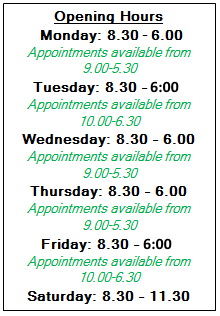Welcome to your Vets in Baldock
We are a small animal vets in Baldock serving the town and surrounding district's pets and people. Baldock Veterinary Centre is a privately owned and family run practice dedicated to providing the best care for dogs, cats, rabbits and exotic pets.
We are partnered with Royston Veterinary Centre which is the longest established veterinary practice in Royston.
Our aim is to provide quality care for your pet whilst being approachable, understanding, helpful and compassionate. As part of our service, emergency veterinary care is provided by our own veterinary surgeons 24 hours a day, ensuring your pet sees our own vets day or night.
**Please do not leave a message on our website or facebook page for emergency advice. These pages are not continually monitored. Please call the surgery on 01462 895579 **







